This blog post, the second part of a two-part series, offers doctors, lawyers, and other busy professionals advanced self-care tips to prevent burnout and increase life satisfaction. Read Part 1 for an introduction on why self-care is important and tips for fitting self-care into a busy schedule.
As we explained in Part 1, the foundation of self-care is physical needs. If you eat poorly, don’t get enough sleep, or don’t exercise, you won’t progress to the higher levels of the self-care pyramid (see below). It won’t matter how value-driven, connected, or accomplished you are. Without basic self-care, you’ll still struggle to reach your full potential.
The self-care pyramid

image from Dr. Lee’s self-care webinar for UCLA’s Alumni Association
Are you already providing your body with everything it needs to be healthy and comfortable? If so, congratulations! You’re ready to move to the next level of the self-care pyramid: physical and mental safety.
Physical and mental safety
Focusing on this level of the self-care pyramid involves creating a physical and psychological environment that makes you feel secure. Are there any people or situations in your life that make you feel ungrounded or unsafe? If so, think about what you can do to change that. If social environments make you feel unsafe due to risks from COVID-19, for example, you could get vaccinated, wear a mask, and socially distance to safeguard your safety.
Mental or emotional safety is also essential. To protect yourself from things that make you feel uncomfortable, you must set boundaries that align with your values. Before you can do that, though, you have to figure out what your values are in the first place. Consider: What is important to you? Is it relationships? Spending time with family? Getting your work done?
You can try journaling, self-reflection exercises, or walks in nature to get in touch with your morals, goals, and principles. As you explore them, remember to focus on what’s important to you—not what’s important to your friends, family, boss, etc. Forget about cultural and societal expectations for a moment. Otherwise, you’ll end up living your life by someone else’s values.
Next, create boundaries that protect your values. If you aren’t very experienced with boundary-setting, you might worry it means saying a firm “no” to everything. On the contrary, it’s possible to communicate boundaries without sounding rigid, mean, or punitive. For example, instead of saying, “No way, I hate operas,” you could refuse a friend’s invitation more gently: “Thank you for your offer. Unfortunately, I can’t make it.” You could also say you need more time to make your decision.
Relationships
Once you’ve addressed your basic physical needs and safeguarded your physical/mental safety, you’ll be ready to move to the third level of the self-care pyramid: relationships. Whether you’re an introvert or extrovert, you need some level of connection to feel supported and fulfilled. Humans are social beings. The quality of that connection is an element of relational self-care.
If you already have many connections, the first step to mastering relationship self-care will be to consider which of your relationships lift you up (and which drag you down). How do you feel when you spend time with each of your friends, family members, co-workers, etc.? How does your partner make you feel? Are there any relationships in your life that are taking more from you than they give back?
Surrounding yourself with people who support you and respect your values is a powerful form of self-care. Achieving this might require setting boundaries with people who drain you (“I can only meet with you for an hour”) or cutting people out of your life altogether. I often have to remind my clients of a metaphorical truth: “You’re not required to set yourself on fire to keep others warm.”
On the flip side, you might need to increase your social exposure if you’ve relatively isolated. Consider reaching out to an old friend. Maybe join a club related to your interests. At the same time, recognize that you might require less social stimulation than others do. If you’re an introvert, you might be able to check off your social boxes simply by hanging out in online interest groups or chatting with your local barista.
Are you struggling to connect with people who are uplifting and supportive? You can still get the relationship-based self-care you need through therapy. An experienced therapist or executive coach can provide you with an unbiased, safe, and productive opportunity to process your experiences. The therapeutic relationship can satisfy your current need for connection while teaching you how to build relationships more successfully in the future.
Esteem needs
Many people have so many unmet needs on the foundational levels of the self-care pyramid that they don’t have enough energy for the things that could make them feel strong, competent, and accepted. As a result, their self-esteem suffers. If this sounds familiar, we encourage you to focus on the first three levels of the pyramid before worrying about anything higher.
On the other hand, perhaps you are already prepared to work on the most advanced level of self-care: esteem needs. If so, there are several ways you can approach this.
One is to increase your professional competence level. By working toward a promotion or other career goal, you can create opportunities to showcase your skills and be recognized by your peers. This will be easier if you’re passionate about your work. If you’re not excited about your job, it may be possible to find a new one that captures your attention and energizes you.
If that’s not in the cards right now, that’s okay. It’s possible to take care of your esteem needs in other, more personal ways. For example, your version of esteem self-care can be spending time on a hobby you love. Sometimes it’s hard to find energy for individual projects, but the right project can actually energize you. Contributing to a charity or other cause that aligns with your values can also give you an esteem boost.
Working on your physical fitness is another great way to increase self-confidence. If you can find some physical activity you enjoy, it will be much easier to stick with it and more rewarding. Becoming stronger and more fit can deliver a significant self-esteem boost, especially when other people notice your progress.
Make Self-Care a Priority
If you find your self-care slipping and continuing to be on the back-burner, help keep self-care a priority by using an executive coach who’s also a trained mental health professional. We’ll be able to help you problem-solve ways to continue incorporating self-care to prevent burnout. Book a free 20 minute consultation call with me Dr. Barajas to see how she can help you find balance and happiness.



